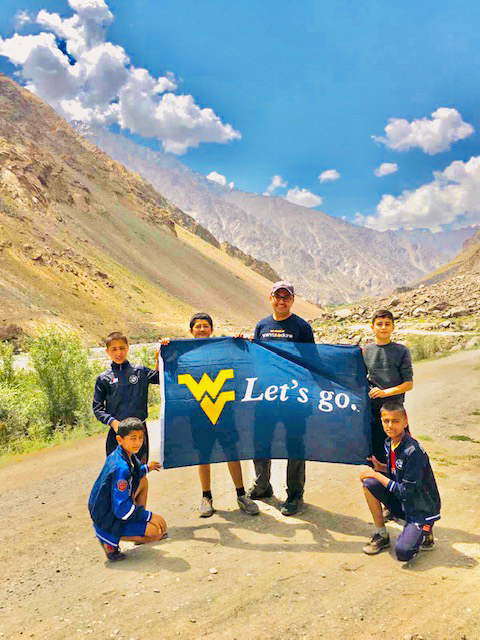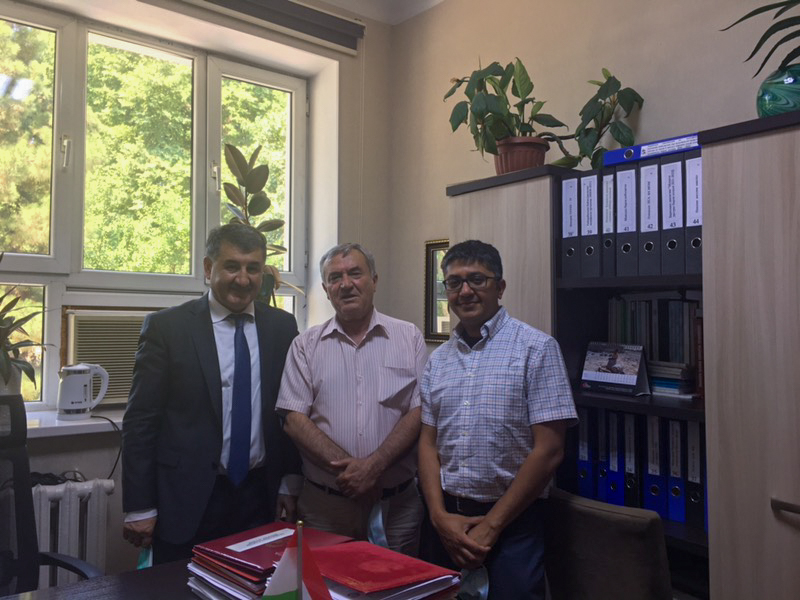Occupational Medicine resident completes international rotation in Central Asia to learn about healthcare infrastructure development

A West Virginia University School of Public Health Occupational Medicine resident, Ryan Budwany, MD, recently completed a month-long rotation in Tajikistan with Medical Diplomats International, a nonprofit organization. Since 2008, this organization has been helping to improve access to healthcare in the isolated mountain regions of the world. The core of its mission is to engage local resources, embrace diverse cultures and heal through medical outreach.
“As the Young Section Chair for the West Virginia State Medical Association (WVSMA), I understand firsthand some of the challenges that our great state faces,” Dr. Budwany said. “I thought that partnering with Medical Diplomats International for this rotation would be an interesting experience because of their mission to help mountain communities.”
 Budwany said he wanted to use his background in public health and healthcare administration to learn more about developing healthcare infrastructure in mountain regions like Tajikistan so that he could contribute more to West Virginia.
Budwany said he wanted to use his background in public health and healthcare administration to learn more about developing healthcare infrastructure in mountain regions like Tajikistan so that he could contribute more to West Virginia.
“It was interesting to learn that regardless of where people live, their background or culture, at the end of the day, their ability to work directly contributes to where they see themselves in their community. Thus, improving the ability for a person to get care or improving a person’s ability to manage medical issues to enable them to work and be productive is something that is valued universally and can help patients both in West Virginia and Tajikistan. This is something that I definitely want to be involved with and build upon with time.”
Tajikistan, a former Soviet Republic, is in the heart of Central Asia and shares its borders with China, Kyrgyzstan, Afghanistan and Uzbekistan. The Badakhshan province has a population of 350,000 people, borders with Afghanistan across the Panj River, and has the unique challenge of being geographically isolated by the Pamir Mountains.
The population has limited access to healthcare and resources with only one private and one government-run hospital to serve an area the size of Delaware. Each of the villages visited has an additional small clinic. The facilities still use Soviet era equipment, which limits the ability to provide optimal care because it may not always be functional. The local government has made investments to improve the medical care and is making progress, but the challenges are many and much work remains.

Budwany’s rotation included a mix of clinical, public health, advocacy and educational activities that focused on the structural and social determinants of health. He gained hands-on experience completing healthcare needs assessments in seven villages and working with local public health officials and the Tajikistan Ministry of Health. Medical Diplomats International donated medical supplies for an outbreak of gastro-intestinal problems in the pediatric population and donated personal hygiene supplies to the local orphanage.
Assessments for future visits were made including the needs for improving public health services, health education, interventional care training and increasing access to rehabilitation services. He negotiated coordinating efforts with other nonprofit organizations, such as the Aga Khan Development Network, and established the infrastructure with local governmental and medical officials that is needed to do future work.
“My main takeaways are that we take many things for granted and this experience puts a lot of things into perspective,” Budwany said. “We are really blessed to have a working public health system and can easily access the vast resources of modern care through WVU Medicine. And while many other places are trying to catch up to the basics, we all can benefit from investing more to improve our public health infrastructure.
“Overall, we are more similar than we are different,” he said. “Maybe it’s in part due to the similar geography – the beautiful rivers and breathtaking mountains. Our struggles are also the same, as many do not have easy access to the care they need because of the lack of resources and geography.
“At the end of the day, what I realized is that we are all mountaineers; like the people in West Virginia, the people in Tajikistan are some of the most hospitable people I have ever met.”
Budwany plans to return to Tajikistan in the future to continue to build upon what the group started – to provide access to healthcare, education and training. More information on Medical Diplomats International can be found at medicaldiplomats.org.
Photo at top: The group visits with a public health official in the remote village of Kuff, one of the highest villages in the country at an elevation of 11,500 feet.
-WVU-
sd/09/16/21
CONTACT: Nikky Luna, Director of Marketing and Communications
WVU School of Public Health
304.293.1699